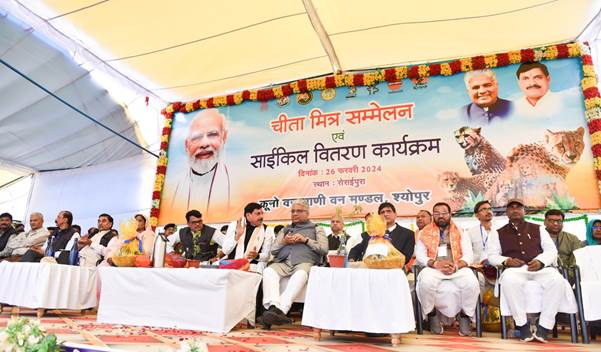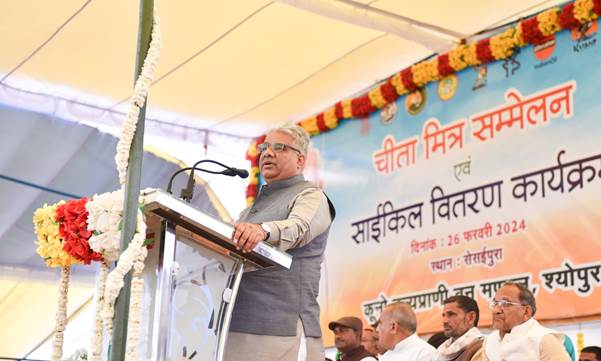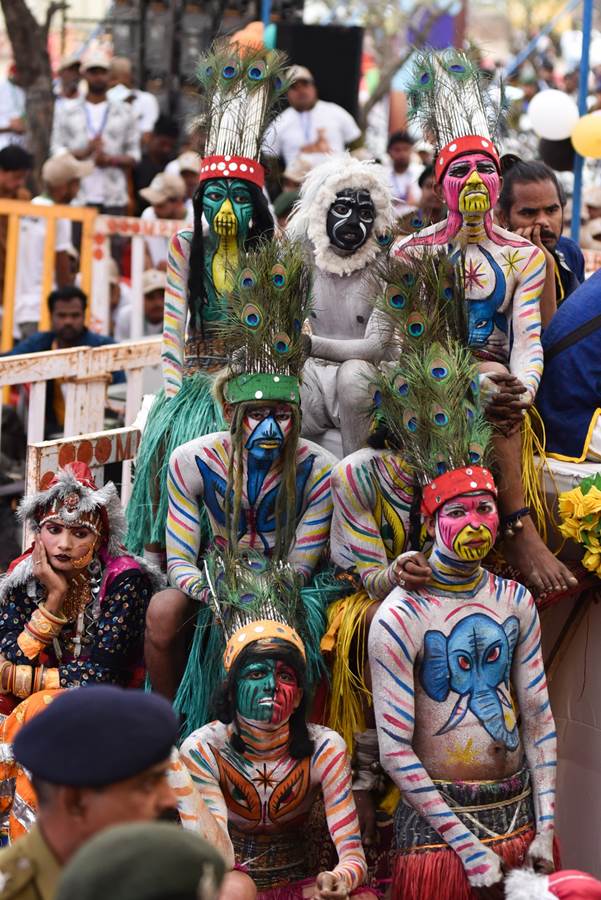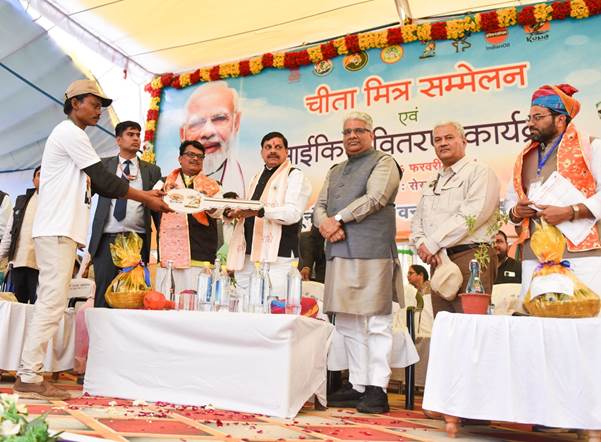Bhupender Yadav emphasises inclusive development of entire landscape connecting Madhya Pradesh and Rajasthan making it a world class eco-tourism centre
Project Cheetah has mobilized the local community and provided them with livelihood options by direct and indirect employment which has resulted in their overwhelming support for cheetah conservation.

In order to strengthen community engagement further, Cheetah Mitras, a workforce of more than 350 people drawn from different sections of society from the fringe villages of Kuno, were provided with bicycles by the Union Minister for Environment, Forest and Climate Change, Government of India, Shri Bhupender Yadav and the Chief Minister, Madhya Pradesh, Shri Mohan Yadav in a function on Monday which was attended by Forest Minister, MP, local MLAs, Public Representatives, DGF&SS Shri Jitendra Kumar, MS NTCA Shri SP Yadav and several senior officials from the State and Centre.


The decision to provide bicycles to Cheetah Mitras was taken on the occasion marking one year of the Cheetah in India on September 17 last year. Equipping Cheetah Mitras with bicycles is a strategic initiative designed to amplify and streamline their contributions to cheetah conservation efforts. The provision of bicycles serves as a practical tool to enhance the efficiency and reach of these volunteers as they carry out their responsibilities in and around Kuno National Park. These cycles were provided by the NTCA through support obtained under Corporate Social Responsibility of NEECO Industries. The Union Minister and Chief Minister, Madhya Pradesh also laid the foundation stone of a fuel station being provided by the Indian Oil Corporation, which shall be run by the Kuno Workers Society.

17th September, 2022 was historical in the arena of wildlife conservation in India with the World’s fastest land animal finally back in India after nearly 75 years of their local extinction from the country. In the first ever intercontinental wildlife translocation and decades after extinction of their Asiatic counterparts in India, eight African cheetahs from Namibia translocated into Kuno National Park in Madhya Pradesh. Subsequently, twelve cheetahs from South Africa were also translocated and released in Kuno National Park in February, 2023.
The entire project was implemented under meticulous supervision of the expert team consisting of Government officials, Scientists, Wildlife Biologists and Veterinarians from Namibia, South Africa and India. The reintroduction of cheetahs is bringing much-needed focus to the conservation of the country’s dry grasslands and will also generate job opportunities for local communities. The success of this project will open up possibilities for rewilding initiatives worldwide.

Most of the Cheetahs are adapting well to Indian conditions and showing expected acclimatisation through hunting, exploration of the landscape, protecting their kill, avoiding/chasing other carnivores like leopards & hyena, establishing territory, internecine fights, courtship and mating & no negative interactions with human beings. Seven introduced Cheetahs have died but none due to unnatural causes like poaching, hunting, snaring, accident, poisoning, and retaliatory killing. This has been largely been possible due to huge community support from the local villages.
It is a challenging project and the early indications are encouraging. Of the 6 criteria given in the Action plan for assessing the short-term success, the project has already met four criteria namely: 50% survival of introduced cheetahs, establishment of home ranges, birth of cubs in Kuno and the project has contributed revenue to the local communities directly through engagement of cheetah trackers and indirectly by way of appreciation of land value in the surrounding areas of Kuno.
The most heartening news so far has been birth & survival of 8 cubs on the Indian soil, taking the total number of Cheetah to 21 in Kuno.

